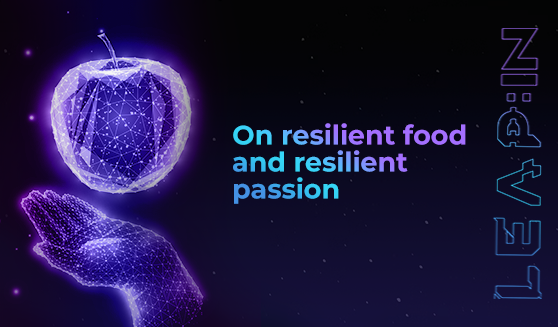
In the run-up to #LEAP23 this February, we’re interviewing some of our speaker line-up – to get a first glimpse into the insights and innovation to come. Here’s just a little bit of what they told us.
subscribe
This week we’re quoting…
Arnavaz Schatten (Director of Sustainability at Infarm)
What Schatten said:
“We need to make our food systems climate-resilient to a new level, making food security a realistic prospect, and breaking the dependence of our food on favourable climate or geopolitical conditions.”
The numbers on food vs climate
It’s a fact: the global food industry has a huge impact on the environment, with emissions skyrocketing.
- The production and consumption of food is the cause of approximately a quarter (27%) of the world’s greenhouse emissions
- Around the world, about 1.3 billion tonnes of food is wasted every year – that’s a third of all the food produced for human consumption. This also means that a lot of the carbon footprint of the food industry is for nothing; we produce food, distribute it around the globe, and then throw it away
- Animal-based food products create double the emissions of plant-based food
- Half of the world’s habitable land (not ice, not desert) is used for agriculture
- A staggering 78% of ocean and freshwater eutrophication (the pollution of waterways with water excessively rich in nutrients) is caused by agriculture
- For every one wild animal on the planet, there are 15 animals kept as livestock for food production – so 94% of non-human mammal biomass in the world is livestock
There’s no doubt that tech is crucial for sustainable agriculture
The human population reached a total of 8 billion in November 2022, up from around 2.5 billion in 1950. Some estimates suggest that the world population could be too big to feed by 2050, at which point food demand will have risen by 70% since 2017.
And already, regions around the world are struggling with famine and food poverty, with the World Food Programme calling 2022 a ‘year of unprecedented hunger’.
Food tech isn’t an exciting industry. It’s an essential one. Technology is the only way we can feed the human population without pushing the planet beyond the brink of a climate crisis.
The good news?
We (that’s the collective, human ‘we’) are working on it.
As well as Infarm’s approach to vertical farming, we’re seeing loads of other future-thinking food technologies in development.
Like…
- A totally new kind of nutrient-rich protein produced using only air and electricity as its main resources (Solar Foods)
- Smart devices like the Plantcube Kitchen, that will allow you to grow healthy, fresh food in your own home – even if you don’t have a garden (agrilution)
- An AI-powered service that helps commercial kitchens reduce food costs by up to 8% – by minimising food waste as much as 70%, becoming more and more effective as it gets to know each specific kitchen (Winnow)
- Cloud-based procurement and inventory systems that enable food and beverage businesses to automate their supply chains with real-time inventory tracking – making the process effortless, and also reducing waste and the overall carbon footprint (Food Market Hub)
…and many, many more.
Read the interview: Vertical farming and the future of food
subscribe
This week we’re also quoting…
Jan Lozek (Founding and Managing Partner at Future Energy Ventures)
What Lozek said:
“If you push personally and have the passion for something you can achieve it. It’s just about you, not a big society.”
This applies to…everything
Lozek was talking about energy transformation – but the notion that passion and effort lead to breakthroughs and major achievements is relevant to everyone, every industry, and every technology.
So this week we wanted to do something we don’t usually do, and give you a practical exercise to do while you drink your coffee. Because passion isn’t always easy to identify; but when you know you’ve got it, you won’t give up.
The exercise
The fact that you’re reading a LEAP newsletter means we’re pretty sure you already have some ideas; some sense of connection and drive in the realm of tech; and perhaps some very specific goals for a business, a product, or for the trajectory of your career.
Our team has loads of ideas too. And we’re really good at picking the most passion-fueled projects out of the mix and making them happen.
So bring one of your ideas or goals to mind. The question we want you to answer is: Am I really passionate about this?
To answer that question, answer these questions first:
- Why is this idea important to me?
- You’ve articulated a reason why your idea is important to you. Now, ask yourself: why is that reason important to me?
To do this, connect that reason with your own values and sense of purpose in life. What have you always imagined you want to do? What kind of person have you always wanted to be?
- How does this idea (and the reason you want to follow through with it) connect to the things you’ve always imagined you want to do, and the kind of person you’ve always wanted to be?
- What could your idea change – for you and your own life; for your community and/or wider society; for the world?
- Do you want that kind of change to happen?
You’ve got some answers…
You’ve got a set of answers now. But you don’t have the answer (yet).
Sit with the values, the purpose, and the possibilities for change that you’ve dug into by answering those questions. You could even close your eyes, take a few breaths, and let it all sink in.
And then ask that final question:
Are you really passionate about this?
Now go for it.
If your answer is yes – go for it. Do the thing. Like Lozek said, it’s just about you: if you’re all in then you can make it happen.
Read the interview: Reasons to be optimistic (about energy)
subscribe








